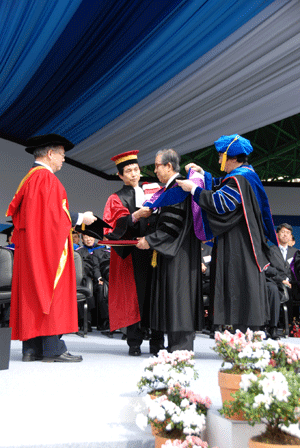people
KAIST awarded an honorary doctorate degree to Keun-Chul Lyu, an Oriental medical scientist who donated property valued at 57.8 billion won (US$56 million) to KAIST at its 2009 commencement ceremony on Feb. 27.
Dr. Lyu who was born in Cheonan, South Chungcheong Province, in 1926 received the first-ever doctorate degree in Oriental medicine from Kyung Hee University in 1976. His researches and practices have had profound impact on Oriental medicine in Korea and elsewhere. He successfully administered acupuncture anesthesia for Caesarean section in 1972, for the first time outside China.
During the three years (1973-1975) he worked at the Kyung Hee University"s Apoplexy Center as superintendent, he developed a new cure incorporating the Oriental and Western medicines for patients seized with apoplexy. With a thesis based on the cure, he earned a Ph.D. in medical engineering from Moscow State Technical University Bauman in 1996.
His outstanding capabilities drew attention in the 1970s when he served as a professor of the Department of Acupuncture at Kyung Hee University and later as deputy director of the university"s Hospital of Oriental Medicine. His record of treating about 50,000 patients a year is still touted among the younger generation of Korean Oriental medicine practitioners.
Dr. Lyu"s unselfish spirit of public service has been well exhibited in that he actively engaged in rendering voluntary medical services in rural and medically disadvantaged areas. He also distinguished himself with his strong interest in donation for humanitarian causes. Among his many charitable activities, his donation of a multipurpose gymnasium and golf practice range to a primary school in his native town Cheonan made so many children happy and helped them develop great ambitions. In 2008, he donated property valued at 57.8 billion won (US$56 million) to KAIST, wishing to help broaden the academic horizon of students studying at Korea"s premier research university.
His donation to KAIST was the largest in amount in the history of private donations to universities in Korea.

-
event KAIST School of Computing Unveils 'KRAFTON Building,' A Symbol of Collective Generosity
< (From the fifth from the left) Provost and Executive Vice President Gyun Min Lee, Auditor Eun Woo Lee, President Kwang-Hyung Lee, Dean of the School of Computing Seok-Young Ryu, former Krafton member and donor Woong-Hee Cho, Krafton Chairman Byung-Gyu Chang > KAIST announced on May 20th the completion of the expansion building for its School of Computing, the "KRAFTON Building." The project began in June 2021 with an ₩11 billion donation from KRAFTON and its employees, eventually gr
2025-05-21 -
event Life Springs at KAIST: A Tale of Two Special Campus Families
A Gift of Life on Teachers' Day: Baby Geese Born at KAIST Pond On Teachers' Day, a meaningful miracle of life arrived at the KAIST campus. A pair of geese gave birth to two goslings by the duck pond. < On Teachers' Day, a pair of geese and their goslings leisurely swim in the pond. > The baby goslings, covered in yellow down, began exploring the pond's edge, scurrying about, while their aunt geese steadfastly stood by. Their curious glances, watchful gazes, playful hops on water
2025-05-21 -
event KAIST Art Museum Showcases the Works of Van Gogh, Cy Twombly, and More at "The Vault of Masterpieces"
KAIST (President Kwang Hyung Lee) opened a special exhibition, "The Vault of Masterpieces", featuring the architects of the Gallerist Hong Gyu Shin, who is active in New York, on April 29th. Since its opening in December 2024, the KAIST Museum of Art, which has mainly exhibited works from its own collection, has boldly invited internationally renowned Gallerist Shin Hong-gyu to hold its first full-scale special exhibition, displaying a large number of his collections in the center of the camp
2025-04-30 -
event Formosa Group of Taiwan to Establish Bio R&D Center at KAIST Investing 12.5 M USD
KAIST (President Kwang-Hyung Lee) announced on February 17th that it signed an agreement for cooperation in the bio-medical field with Formosa Group, one of the three largest companies in Taiwan. < Formosa Group Chairman Sandy Wang and KAIST President Kwang-Hyung Lee at the signing ceremony > Formosa Group Executive Committee member and Chairman Sandy Wang, who leads the group's bio and eco-friendly energy sectors, decided to establish a bio-medical research center within KAIST and i
2025-02-17 -
research KAIST Develops Wearable Carbon Dioxide Sensor to Enable Real-time Apnea Diagnosis
- Professor Seunghyup Yoo’s research team of the School of Electrical Engineering developed an ultralow-power carbon dioxide (CO2) sensor using a flexible and thin organic photodiode, and succeeded in real-time breathing monitoring by attaching it to a commercial mask - Wearable devices with features such as low power, high stability, and flexibility can be utilized for early diagnosis of various diseases such as chronic obstructive pulmonary disease and sleep apnea < Photo 1. Fro
2025-02-13